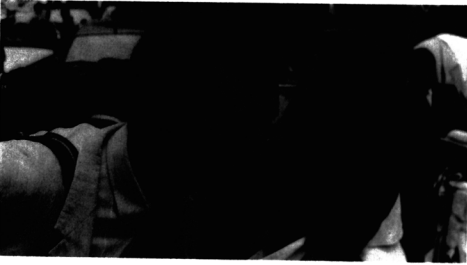1.2: ALLER, to go
- Page ID
- 142286
ALLER, to go
| Je vais à Paris. | I'm going to Paris. |
| Tu vas bien. | You're well. |
| Elle va à Marseille. | She's going to Marseille. |
| Nous allons à la bibliothèque. | We're going to the library. |
| Vous allez à Nice. | You're going to Nice. |
| Ils vont partir. | They're going to leave. |
| Passé composé: je suis allé, ... | |
| Imparfait: j'allais, ... | |
| Futur: j'irai, ... | Futur proche: je vais aller, ... |

Questions et réponses
D. Are you (sick)?
Now that you know how to ask, and reply to, the conventional question regarding your health using the verb aller, we'll introduce you to another very useful construction that—happily—is almost exactly like its English equivalent. (By the way, PLEASE don't write translations in your book: you'll find it is counterproductive, especially when you return to this for review.)
| —Êtes-vous malade? | teacher to student |
| —Oui, je suis malade. | |
| —Vous êtes fatigué(e)?3 | |
| —Oui, je suis fatigué(e). | |
| —(Marie) est présente? | teacher to student, re: other student, f. |
| —Oui, elle est présente. | |
| —Est-il grand? | teacher to student, re: other student, m. |
| —Oui, il est grand. | |
| —Êtes-vous paresseux? | teacher to students |
| —Oui, nous sommes paresseux. | all students to teacher |
| —Posez la même question à votre voisine. | teacher to student, re: other student, f. |
| —Tu es paresseuse? | student A to student B, f. |
| —Oui, je suis paresseuse. | |
| —Sont-ils sportifs? | teacher to student, re: group of students |
| —Oui, ils sont sportifs. | |
| —Et elles, elles sont sportives? | teacher to student re: group of students, f. |
| —Oui, elles sont sportives. |
3 See the Reference Grammar, 18.1, and the discussion of intonation patterns in the Pronunciation notes.
Characteristics to include in this section:
| bon, bonne | petit, petite | heureux, heureuse |
| content, contente | prêt, prête | absent, absente |
| gentil, gentille | "sympa" | actif, active |
Note: Your instructor will do an exercise at this time using negative forms. You do not have to use those negative forms yourself, but you should have no difficulty recognizing that your instructor is saying something like, "She is not X."
Grammar Notes: As you did above for aller, you have now used all the forms in the present tense of the verb être (see below), and reused all the subject pronouns. Furthermore, you have seen masculine and feminine forms of a number of adjectives (Reference Grammar, 2.4.1).
ÊTRE, to be
| Je suis grand. | I'm big. (I'm tall.) |
| Tu es gentil. | You're nice. |
| Elle est sympa. | She's very nice. |
| Nous sommes heureux. | We're happy. |
| Vous êtes malade. | You're sick. |
| Ils sont ici. | They're here. |
| Passé composé: j'ai été, ... | |
| Imparfait: j'étais, ... | |
| Futur: je serai, ... | Futur proche je vais ètre. |

